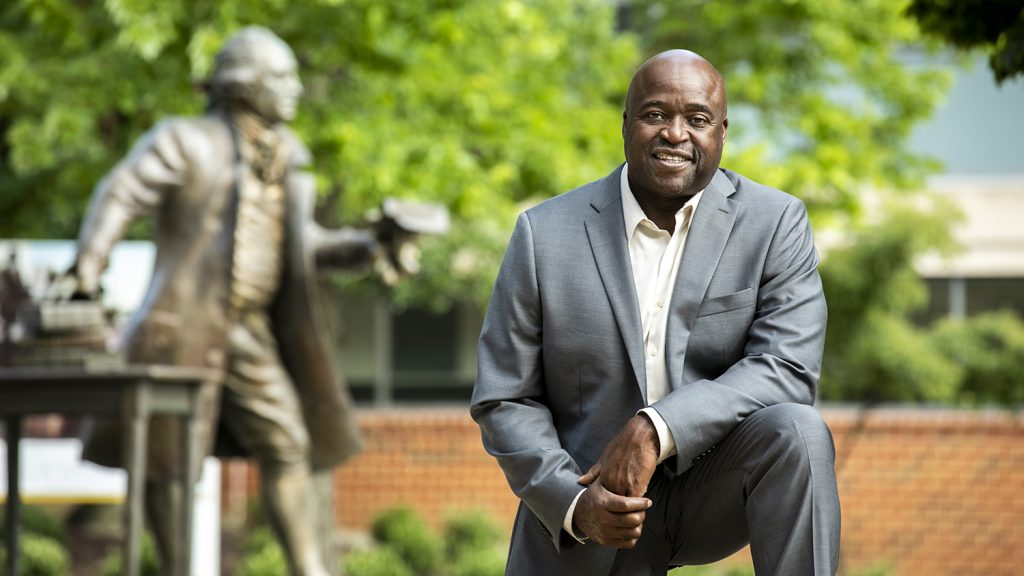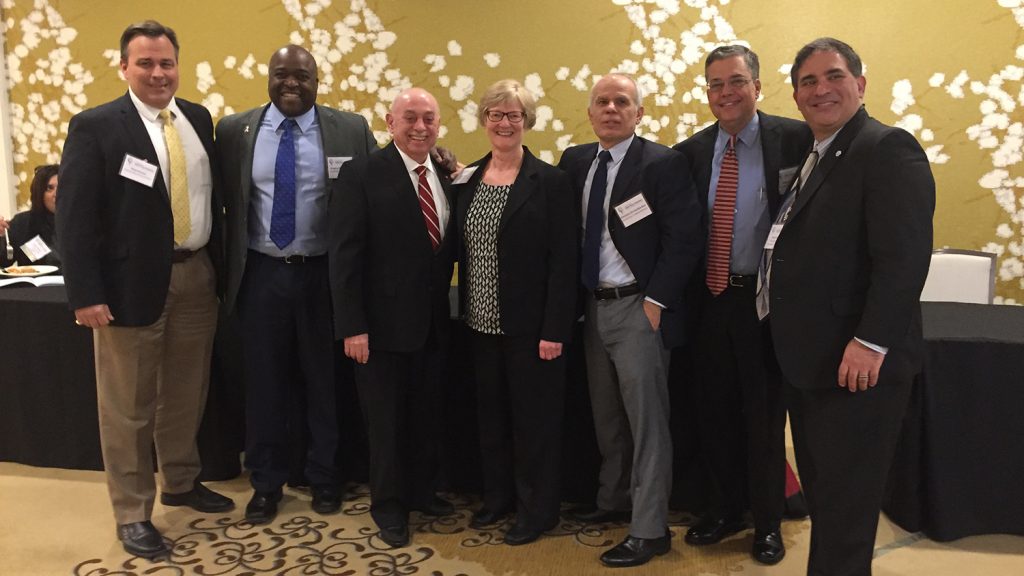
February 5, 2021 | Tim Peeler
Gregory Washington has always been an advocate for and instigator of improvement.
A three-time NC State graduate, Washington is now at the forefront of a new wave in academia — engineers who are presidents, provosts, or deans at universities and colleges across the country. And so many of them are affiliated with NC State that they get together every year at the Engineering Deans Council for a group picture.
Last February, Washington was named the eighth president — and the first ever African American leader — of George Mason University in Fairfax, Virginia, after spending the past eight years as the Dean of Engineering at the University of California–Irvine. It’s a unique position for Washington: only 14% of presidents at doctorate-granting universities possess an engineering degree, according to the American Council on Education; fewer than 8% are African American, according to Inside Higher Education.
“We live in a time when technology is changing at an astounding pace, when external resource development is critical to the campus’s survival when issues like [information technology] and commercialization are a big part of that and when developing strong partnerships with industry are essential,” Washington says. “All of these are drivers that call for engineers to be academic leaders.
“This is where universities, especially those with large think programs, are putting their resources and positions.”
Filling the Leadership Gap
Universities nationwide are increasingly looking for academic leaders like Washington whose background in engineering gives them the problem-solving skills and partnership experience they need to be effective. Many of those leaders began or developed their careers at NC State: Nancy Albritton, a department head at the UNC/NC State Joint Department of Biomedical Engineering who is now the dean at the University of Washington; Elizabeth Loboa, a former biomedical engineering professor who has served as the dean of engineering at Missouri and is now the provost at Southern Methodist; Sarah Rajala, a former associate dean in the College of Engineering who is now retired after serving as dean of engineering at both Mississippi State and Iowa State; Paul Orkwis, who earned a doctorate at NC State and has served as department head and interim dean at Cincinnati; Christos Christodoulou, who earned his master’s and Ph.D. at NC State and is now the dean of engineering at New Mexico; Peter Kilpatrick, former professor and department head in chemical engineering who is the former dean of engineering at Notre Dame and is now the provost at Illinois Tech; Justin Schwartz, a former department head in materials science and engineering who is now the dean of engineering at Penn State.
“NC State is a place that emanates leaders nationwide,” says College of Engineering Dean Louis Martin-Vega.

Washington has plenty of experience as a change-maker. The New York native who graduated from Raleigh’s William Enloe High School in 1984 has always had an engineer’s “see a problem, fix a problem” mentality and leadership qualities he gained from participating in NC State’s ROTC program.
He studied mechanical engineering at NC State, earning a Bachelor of Science degree in 1989, a master’s degree in 1991, and his doctoral degree in 1994 with a Ph.D. thesis entitled “Modal Control of Reflector Surfaces for Far-Field Power Maximization.” His academic career includes research on lightweight antennae, self-driving vehicles, and smart materials. (One of his favorite things about his new place of employment — the largest public research institution in Virginia — is the self-driving, food-delivery robots that crisscross campus 24 hours a day with hot food on demand.)
And as much as he enjoyed his studies, Washington also saw how a university in transition could be improved.
Change Agent
“From Day 1 as a student, my job was always to make NC State better,” Washington said while accepting a 2020 College of Engineering’s Distinguished Alumni Award from the NC State Alumni Association last November.
As an undergraduate, he and fellow students unhappy with the coverage of African American issues started the Nubian Message. NC State’s weekly African American publication recently celebrated the 25th anniversary of its first edition.
“There were a number of us who never thought that the newspaper would make it beyond our time there,” Washington says. “We were committed to doing what we could to support it and keep it going. I’m just ecstatic to see that it’s still there.”
When academic leaders on campus were upset that basketball coach Jim Valvano’s players weren’t graduating with regularity, Washington stepped up to be a student math tutor for the basketball program.
“What I remember about Greg is that he was so patient with me,” says former NBA standout Chucky Brown, who entered NC State as a 17-year-old freshman in 1988. “I was very immature and he never gave up on me. I think about that a lot today.”
It taught Washington to look deeper for the skills in students — whether they were athletes, classmates, or both.
“I learned that even though some of these guys were not doing the best academically all the time, they were pretty smart people,” he says. “It’s just that they had so many different things pulling on their time, it was hard to keep up. Math is like anything else, if you don’t put the time into studying it, you’re probably not going to do well on exams.”
The discussions on racial equity Washington began as a student more than three decades ago — when NC State first opened the Augustus Witherspoon Student Union that contains the African American Cultural Center, the Nubian Message and other student organizations — are still ongoing.
“Greg was really ahead of his time,” says Martin-Vega. “His feelings are very powerful and have driven him to the position and success that he enjoys today.”
Challenges and Opportunities
Near the end of his undergraduate career, Washington and several other students were struggling in some of their engineering classes because of communication issues with teaching assistants in some of the most complicated classes. So they went to talk to then-Dean Larry Monteith. As they were leaving the meeting, Monteith called Washington aside.
“Oh, no, now I’m about to get kicked out of school,” Washington thought.
Instead, Monteith challenged Washington, a first-generation college student, to help make some changes. He told him he would set him up in a lab. And he helped find the right financial aid to get him through graduate school, including the Patricia Roberts Harris Fellowship, a federal postgraduate scholarship for women and underrepresented minorities named after a pioneering Howard University scholar and U.S ambassador.
“He told me if I earned my Ph.D., he would make sure I wouldn’t have to pay for anything,” Washington says. “That was a put-up-or-shut-up moment for me.
“It’s what started me on my academic career.”
After earning his Ph.D., Washington interviewed with several private companies before deciding to accept a position as an assistant professor of mechanical engineering at Ohio State in Columbus, Ohio. After nearly a decade on the Ohio State faculty, during which he led the Institute for Sustainable Energy and the Environment, Washington had some thoughts on how to improve the Buckeye State’s biggest engineering program. He shared them with his dean. Two weeks later, he was named the associate dean of research, paving his way into the upper levels of administration, including a stint as Ohio State’s interim dean of the College of Engineering.
In 2011, he was named the dean of the Henry Samueli School of Engineering at UC Irvine, becoming the first African American engineering dean in the University of California system. When George Mason began looking for a new president in late 2019, Washington’s background and experience as an academic leader was exactly what the school was looking for.
“Greg fits George Mason like a glove,” Martin-Vega says. “It is a school that has grown very quickly in both enrollment and research with a diverse student body and tremendous potential. Greg is a very charismatic individual with a really big heart. He’s going to do great things for that school.”
This post was originally published in NC State News.